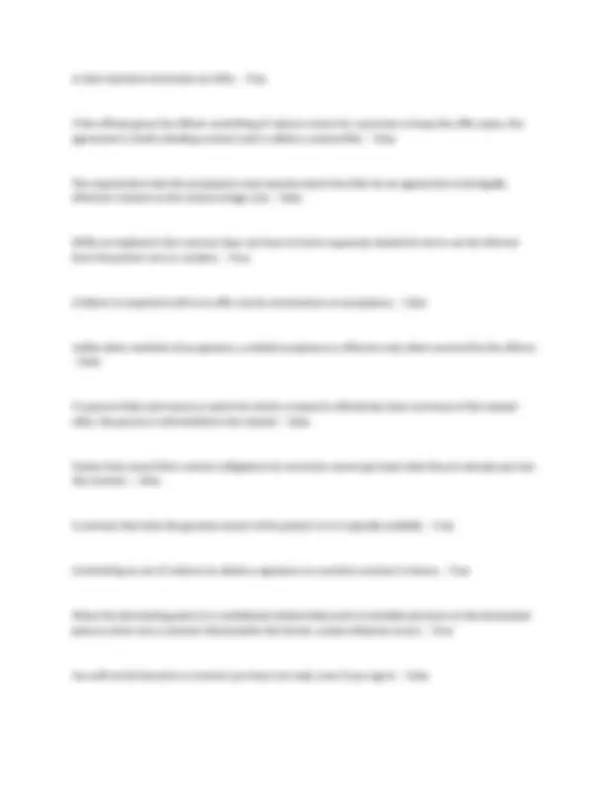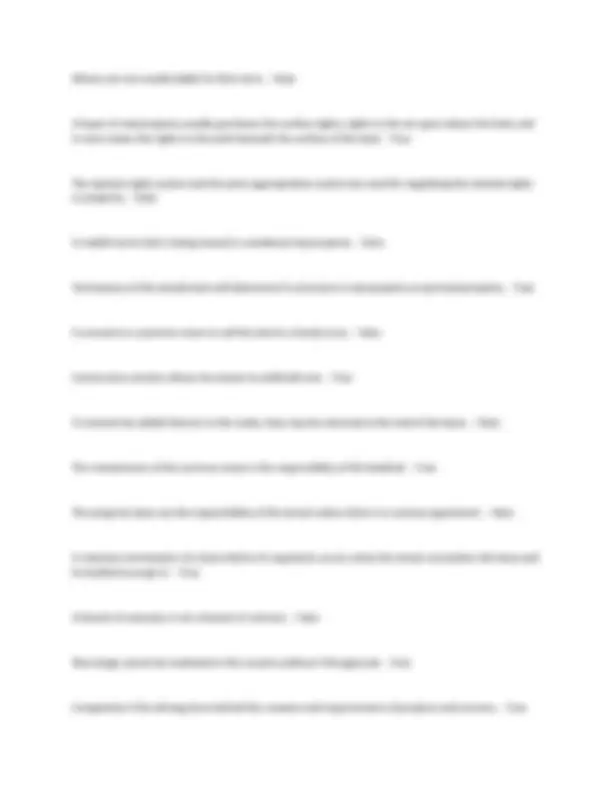








Study with the several resources on Docsity

Earn points by helping other students or get them with a premium plan


Prepare for your exams
Study with the several resources on Docsity

Earn points to download
Earn points by helping other students or get them with a premium plan
Community
Ask the community for help and clear up your study doubts
Discover the best universities in your country according to Docsity users
Free resources
Download our free guides on studying techniques, anxiety management strategies, and thesis advice from Docsity tutors
A comprehensive review of business law and ethics, presented in a true/false question-and-answer format. It covers a wide range of topics, including the legal system, ethical reasoning, administrative agencies, constitutional rights, cyber law, court procedures, criminal law, torts, and contract law. The material is designed to test understanding of key legal concepts and principles, making it a valuable resource for students preparing for exams or seeking to reinforce their knowledge of business law and ethics. The questions cover various aspects of the legal and ethical landscape, offering a broad overview of the subject matter. It is updated to reflect the latest information for 2025/2026.
Typology: Exams
1 / 11

This page cannot be seen from the preview
Don't miss anything!







The Laws, or enforceable rules of conduct in a society, do not reflect the culture and circumstances that create them. - False Laws in this country are created only at the federal and state levels of government. - False The Supreme Court of the United States is the final interpreter of the federal Constitution. - True The world's two great systems of law are the English common law and the Napoleonic Code. - False Ethical reasoning about right and wrong is based solely on consequences. - False Administrative agencies are usually controlled by the judicial branch go government. - False The goal of civil disobedience is to advance the self-interest of one group over another. - False The system of law in the United States is based on English common law. - True The doctrine of stare decisis requires lowers courts to follow established case law in deciding similar cases. - True In the United States, law courts and equity courts generally are merged. - True The Bill of Rights consists of the first ten amendments to the U.S. Constitution plus the Thirteenth, Fourteenth, and Fifteenth Amendments added after the Civil War. - False The agency that deals with discrimination int he workplace is the Equal Employment Opportunity Commission. (EEOC) - True
The Internet began as a collaboration between the government and academic computers. - True Even though political parties are very important in the selection of candidates for federal offices, they are not mentioned in the Constitution. - True Obscenity is judged on a national standard. - False The question of jurisdiction is based on two legal considerations: the laws of the state in which the case is filed and the long arm of the law. - False The right of privacy is not specifically mentioned int eh Constitution or the Bill of Rights. - True The Senate can block any action of the House, but the House cannot block any action of the senate. - False The issue of jurisdiction is a settled area in cyber law. - False In the state court system, is is the marshal's duty to summon witnesses and keep order in the court. - False When a decision is made by a mediator, it is binding on the parties to the dispute. - False The United States Supreme Court has original jurisdiction over all cases in the country. - False Appellate courts usually decide whether there were errors of law and errors of fact in the trial. - False There are thirteen federal courts of appeal. - True The state legal system, as well as the federal, has three branches of government. - True
A violation of the duty need not be proved before the injured party can collect damages. - False Money damages received as a result of a tort is intended to compensate for the injury. - True When there is a jury, the judge decides the issues of both law and fact. - False Answers are typically filed in order to call defendants to court. - False All torts require that the defendant intended to injure the plaintiff. - False Most tort duties are defined by state law. - True A causal connection between the duty and the breach of the duty is called causation. - False Battery and negligence are intentional torts. - False Contributory negligence is a defense to the tort negligence. - True Punitive damages are always available where an intentional has been committed. - True The person to whom an offer is made is termed the offeror. - False All contracts have to be in writing to be enforceable. - False A store display of a MP3 player marked 121.00 would be an offer. - False The right to withdraw an offer before it is accepted is known as the right of redemption. - False
A clear rejection terminates an offer. - True If the offeree gives the offeror something of value in return for a promise to keep the offer open, this agreement is itself a binding contract and is called a counteroffer. - False The requirement that the acceptance must exactly match the offer for an agreement to be legally effective is known as the reverse image rule. - False While an implied-in-fact contract does not have its terms expressly stated the terms can be inferred from the parties' acts or conduct. - True A failure to respond at all to an offer can be construed as an acceptance. - False Unlike other methods of acceptance, a mailed acceptance is effective only when received by the offeror.
The payment of money for the release of an unliquidated tort claim is adequate consideration to make the release enforceable. - True A promise to make a gift to a charitable organization can be made enforceable by the charity sending a written request for the money to the potential donor within 30 days. - False A debt discharged through the debtor's bankruptcy proceeding can be reaffirmed by the debtor without any additional consideration for the subsequent promise to repay. - True Minors have contractual capacity. - False Incapacitated parties need to pay only the fair market value rather than the contracted price of necessaries. - True After the age of majority, the power to disaffirm is immediately cut off if the person ratifies the contract.
Minors are not usually liable for their torts. - False A buyer of real property usually purchases the surface rights, rights to the air space above the land, and in most states the rights to the earth beneath the surface of the land. - True The riparian rights system and the prior appropriation system are used for regulating the mineral rights or property. - False A mobile home that is being towed is considered real property. - False Permanency of the attachment will determine if a structure is real property or personal property. - True A covenant is a promise never to sell the land in a family trust. - False Constructive eviction allows the tenant to withhold rent. - True If a tenant has added fixtures to the realty, they may be removed at the end of the lease. - False The maintenance of the common areas is the responsibility of the landlord. - True The property taxes are the responsibility of the tenant unless there is a contrary agreement. - False A voluntary termination of a lease before its expiration occurs when the tenant surrenders the lease and he landlord accepts it. - True A breach of warranty is not a breach of contract. - False New drugs cannot be marketed in this country without FDA approval. - True Competition if the driving force behind the creation and improvement of products and services. - True
The history of U.S. labor law reveals great hostility toward unions. - True Now most labor relations problems are resolved by the National Labor Relations Board. - True Common employment interests should be included in the bargaining unit. - True If management denies voluntary recognition, the union can conduct a representation election. - False Collective bargaining is the process of negotiating a binding employment contract by the union and the courts. - False Those who die without a valid will are said to have died testate. - False A will is a legal expression by which a person directs how his or her property is to be distributed after death. - True Once made, a will cannot be changed or canceled. - False Some statutory provisions allow certain relatives to override the will's terms and receive more of the estate than the will provided. - True The property of the deceased escheats to the state if there are no inheritors. - True Codicils can be made to accomplish any conceivable legal purpose. - False A trust created for the fulfillment of an altruistic purpose is known as a spendthrift trust. - False A resulting trust is formed when the entity intended to receive the benefit of an express trust cannot do so. - True
The creator of a trust is known as the trustee. - False Trusts are named by the timing and purpose of their creation. - True To be classified as an employee, a person must be receiving pay. - True Any person who performs a task with financial value for another person is an employee. - False A person need not be supervised to be classified as an employee. - False An independent contractor receives pay without supervision. - True Only written employment contracts are valid. - False A party who violates an express term is liable for breach. - True The minimum wage and overtime requirements of the law do not apply to executives, administrators, and professional workers. - True Payroll deductions are taken from the employee's paycheck by the employer. - True The person who hired an independent contractor usually is liable for the contractor's torts. - False All employees are entitled to due process before being discharged. - False